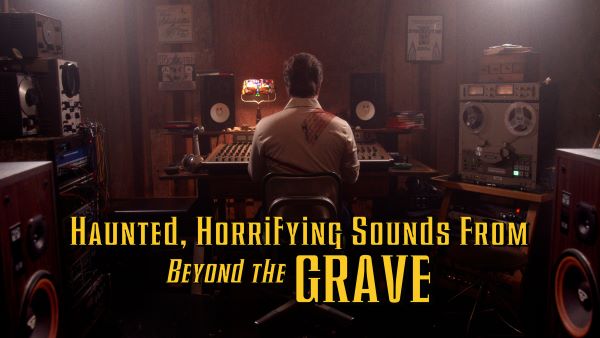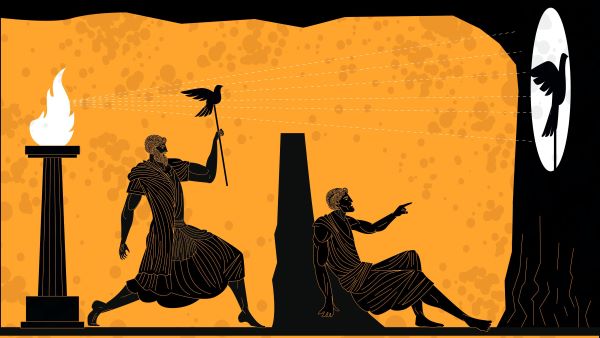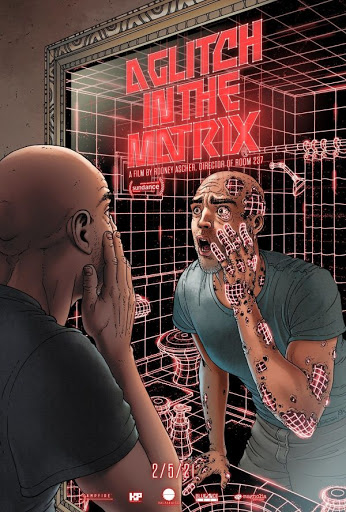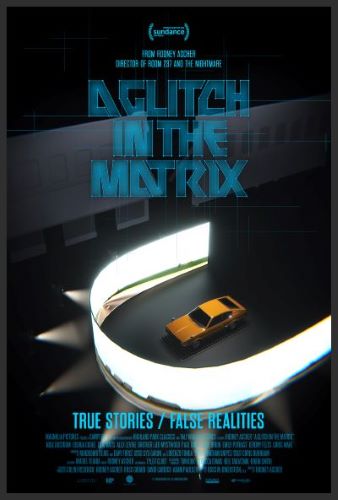An Analysis of Rodney Ascher’s A Glitch in the Matrix
Written by Matteo SedazzariA Glitch in the Matrix is a documentary by filmmaker Rodney Ascher, whose other documentaries cover a variety of subjects. Stanley Kubrick’s The Shining in ‘Room 237’,
sleep paralysis in ‘Nightmare’ and rock music, with a study of Eldon ‘El Duce’ Hoke, and the shock metal band he fronted in the 90s, The Mentors who performed in Black executioners’ hats and with offensive lyrics that they became the subject of discussion in the US Senate. Any band with attitude would love to be denounced by their own government.
Along with documentaries, Ascher has made a number of short films, mainly of the horror genre, ‘Haunted, Horrifying Sounds from Beyond the Grave’, a film set in the 1970s, where a musician is asked to make a Halloween sound effect album. ‘Visions of Terror’, a young woman has a horrifying and supernatural experience with a collection of recently discovered VHS Tapes.

Ascher’s films, fiction or non – fiction, indicate that he has a taste for the macabre, an interest in pop culture, a curiosity for the extraordinary, as well as the meaning of life, as A Glitch in the Matrix certainly falls into this category.
Ascher and Producer, Ross M. Dinerstein (Silicon Cowboys, 1922) ask the question, whether we are part of a game simulation? known as simulation theory. This has been a topic of discussion since 1999 due to the popularity and huge success of the Wachowskis’ The Matrix trilogy. The story of Neo (Keanu Reeves), a computer programmer in a future dystopian society, where civilisation is not thriving in a natural environment but instead is suffering in a virtual reality.
The title A Glitch in the Matrix, comes from the film, in reference to Déjà vu, ‘a feeling of having already experienced the present situation’. But in the Matrix universe this is not actually a spiritual encounter but in fact a technical problem, a glitch.
A Glitch in the Matrix is a lively and bright film, that moves rapidly like a video game, with a mixture of classic film footage, Google Earth, computer animation, and video conference interviews. Even prior to lockdown, interviews via platforms like Skype, Microsoft Teams, ZOOM, etc, have become the norm, with buffering included.
Ascher spices this new form of communication up by making some of the interviewees look like digital avatars, whilst some of the other subjects appear in their 3D human form. The contrast works well, as it gives it A Glitch in the Matrix the feel of a classic science fiction film.
As the digital avatars and those in human form discuss their experience and theories on whether we are living in a simulation world that maybe controlled by outside forces, their debate is emphasised by footage from films like The Matrix or The Truman Show, which predicted the reality TV phenomena in 1998, and movies that foretell a dystopia world, Logan’s Run, Blade Runner and such like.

As the interesting discussion unfolds, Ascher introduces the moment the concept of the simulation reality was announced to the world in the 20th Century. The science-fiction legend author and the maestro of dystopian fantasy, Philip K Dick, (Do Androids Dream of Electric Sheep? The Minority Report and many more), those not familiar with his writing will know his work via the cinema, for instance, Blade Runner is based on Do Androids Dream of Electric Sheep, and Dicks held a press conference in Paris February 1977, just when The Sex Pistols were stirring up anarchy in the UK.
Most were expecting Philip K Dick, to discuss his work and forthcoming novels, yet he wove in religion and philosophy, and the concept that we might be living in a stimulation universe. A concept that Philip K Dick states came to him via the use of drugs and his dreams.
Yet this concept of a stimulate reality wasn’t born in the 20th Century. French philosopher, mathematician, and scientist, Rene Descartes, (31st March 1596 – 11th February 1650), who coined the term ‘I Think Therefore I Am’, is mentioned in A Glitch in the Matrix as one of the pioneers of the ideology of simulation reality.

And that is the beauty and strength of A Glitch in the Matrix, Ascher’s ability and talent to introduce unique philosophy and interesting events in popular culture. In simple terms, it is an informative documentary, whether you agree with the subject matter or not, you are bound to learn something from the film, without going down a rabbit hole.
For me, there are two points covered in the film that I found thought-provoking and poignant, which are just as applicable in today’s society as they are to a discussion about stimulate reality.
Allegory of the cave or Plato’s cave, from his work Republic (514a–520a) is examined in A Glitch in the Matrix as a form of mind control, in shaping their concept of reality, which in turn forms their belief system. Using animation akin to The Tell-Tale Heart, 1953, narrated by James Mason, Ascher presents the debate between Plato's brother Glaucon and Socrates, told by Plato. In a cave, dwell a small collection of prisoners, who are chained to the wall, and the only thing facing them is a blank cave wall. Their captors perform shadow puppet shows from the light from a fire that burns behind them, these shows become their window to the outside world. The analysis is heightened by Plato, who states that if one of the prisoners is set free, he would have trouble adjusting his vision from the flames of the fire and to the sunlight if he stepped outside the cave. Moreover, if he returned to the cave and told his fellow prisoners that there is another world that is better, the remaining prisoners will not believe his concept, and probably kill him, as they would rather have enslavement than accept another reality that is actually real. When I saw this, I wasn’t thinking about stimulate reality, yet the allegory of Plato’s cave is similar to censorship by some media outlets and governments, where those that question their reality are ostracized or even disposed of.

Another issue highlighted within A Glitch in the Matrix, is whether violence in films has an impact upon the audience. Even though Ascher doesn’t directly ask the question within the film, he and his team emphasise upon the tragic story of Joshua Cook who, then aged 19 in February 2003, murdered his adopted parents, by shooting them with a shotgun in Fairfax, Virginia, after helping them shovel snow from their driveway. Cook was, at the time, a huge fan of The Matrix, he had watched the film on numerous occasions, knew the dialogue off by heart, had the film poster above his bed, donned the same leather black trench coat and black boots as worn by Keanu Reeves and, due to Cook being unhappy and feeling lonely, he believed that he might be living in a simulation reality, so if he kills his parents the game might end, and a new one might begin….
Originally Cook’s defence team used ‘The Matrix defense’, as used by Tonda Lynn Ansley of Hamilton, Ohio, July 2002, who shot her landlady and Vadim Mieseges of San Francisco, May 2000, who chopped up his landlady, both declared that The Matrix was to blame. However, Cook decided not to use this defence and pleaded guilty instead.

Blaming films, books, comics, or even records, has been around for many years, especially in the US. A classic example is in July 1990, Judas Priest stood trial for the suicide pact of 20-year-old James Vance and 18-year-old Raymond Belknap, in Sparks, Nevada, who both shot themselves in a playground on 23rd December 1985. Belknap died instantly, while Vance survived for a further three years. The parents of these boys believed that Judas Priest’s 1978 Stained Class album was to blame, a tragic case on all counts, with no winners, well apart from the lawyers and their huge fees.
Cook recounts the events that led to the murder of his adopted parents, with a chilling yet open audio interview with Ascher, from prison. Cook doesn’t want other young people to make the same tragic mistake as him, therefore he is using his incarceration and crime not as a cautionary tale but as a wake-up call. I was choked up, when he graphically recalls the fear of his adopted parents, as they knew he was going to murder them, it is a sombre moment within the film, which has left a lasting impression. Cook needed help, he did wrong, and now he's trying to help others. But it is hard for me to like Cook, for he committed the ultimate sin, yet he is trying to prevent others from doing the same, I won’t applaud him, but I respect his effort.
A Glitch in the Matrix is an intelligent film with science, philosophy, conspiracy theory, and the stress of living in a modern society. No concrete evidence is presented whether we do live in a virtual reality, which is parallel to the question, is there life after death? We don’t know the answer to either until we pass away, so enjoy the moment, whether real or not, and enjoy A Glitch in the Matrix.
A Glitch in the Matrix out on DVD
A Glitch in the Matrix out on Amazon Prime
Matteo Sedazzari
Latest from Matteo Sedazzari











